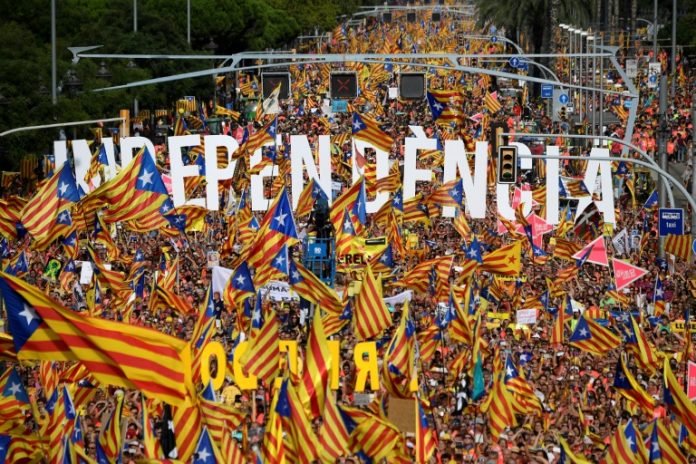Divided after their failed 2017 secession bid, Catalan separatists will rally in Barcelona on Wednesday in a test of strength before a Spanish court rules on the fate of those who led the independence push.
September 11 is Catalonia’s national day which marks the fall of Barcelona to Spain in 1714.
Known as the “Diada”, it has always been widely observed, but since 2012 Catalan separatists have used the occasion to hold massive rallies that in the past have drawn up to a million people.
This year’s demonstration will take place in Plaza Espana in Barcelona at 1714 (1514 GMT) in a nod to the anniversary.
The rally comes just a few weeks before the Supreme Court is to deliver verdicts in the high-profile trial of 12 separatist leaders charged over their role in Catalonia’s separatist bid, which plunged Spain into its worst political crisis in decades.
Former Catalan vice-president Oriol Junqueras and eight others face the most serious charge of rebellion. Public prosecutors have asked that he spend 25 years behind bars.
Catalan separatist leaders have for months tried to prepare a united response to the looming verdicts, but they remain increasingly split over strategy.
“On the eve of these verdicts, it is important that we are seen as strong and massively mobilised,” Elisenda Paluzie, president of powerful grassroots pro-independence group ANC which organises the protest, told media.
The mood in the separatist camp is very different from two years ago when Catalonia’s regional government pushed ahead with a banned independence referendum on October 1, 2017 — marred by police violence – then made a short-lived declaration of independence.
Senior separatist leaders are in jail awaiting judgement or scattered abroad, like former Catalan president Carles Puigdemont who fled to Belgium shortly afterwards.
While separatists control Catalonia’s regional government, they have been unable to agree on how to push for independence.
With the event dominated by the separatist agenda, many who favour staying with Spain keep away.
Prime Minister Pedro Sanchez described it as “an especially important day” for Catalonia and said he hoped it would once again unite all Catalans.
“Let’s hope a day comes when the Diada becomes the festival for all Catalans and not just a part of them,” he told parliament on Wednesday.
At the rally, demonstrators will form the shape of a giant star which the ANC says will symbolise a state “as well as the joint effort of the Catalan people to defend their right of self-determination”.
“It is essential to have a united strategy that allows us to achieve independence. The first step is filling the streets on September 11,” an ANC statement said.
Writing on Twitter, Puigdemont said the rallies would demonstrate that the Catalan desire for independence was very much alive.
“Today we will once again show the world that we will carry on, despite the repression, that we have the right to live freely in peace and that no-one can decide our future for us.”
But two years on from the independence bid, the two main separatist parties that govern Catalonia are bitterly divided over the path ahead.
Puigdemont’s Together for Catalonia party has called for “confrontation” with Madrid if the Supreme Court hands down guilty verdicts.
But Junqueras’ leftist party ERC has called for dialogue with Spain’s central government, which is less hostile to the separatists since Sanchez’s Socialists came to power in June 2018.
Catalan vice president Pere Aragones of the ERC on Tuesday said the “harsher the sentence… the greater the need there will be to settle this issue politically”.
Against this backdrop of division, there are fears that turnout at this year’s rally will drop.
Quim Alvarado, a 47-year-old historian from the town of Figueras, said he saw no reason to attend.
“We are at an impasse that I fear will be eternal. I am certain that my generation and the next will not see independence,” he said.
Radical separatists meanwhile have called for an alternative rally outside of Catalonia’s regional parliament, which they want to occupy.
















